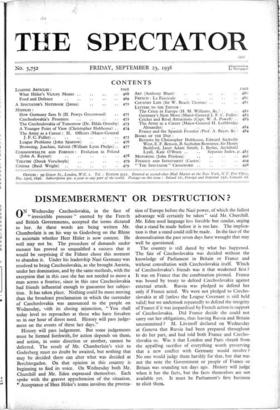DISMEMBERMENT OR DESTRUCTION ?
ON Wednesday Czechoslovakia, in the face of " irresistible pressure " exerted by the French and British Governments, accepted the terms dictated to her. As these words are being written Mr. Chamberlain is on his way to Godesberg on the Rhine to ascertain whether Herr Hitler is now content. He well may not be. The procedure of demands under menace has proved so unqualified a success that it would be surprising if the Fiihrer chose this moment to abandon it. Under his leadership Nazi Germany was resolved to bring Czechoslovakia, as she brought Austria, under her domination, and by the same methods, with the exception that in this case she has not needed to move a man across a frontier, since in this case Czechoslovakia had friends influential enough to guarantee her subjec- tion. It has taken place. Nothing could be more moving than the broadcast proclamation in which the surrender of Czechoslovakia was announced to the people on Wednesday, with its closing injunction, " You shall today level no reproaches at those who have forsaken us in our hour of direst need. History will pass judge- ment on the events of these last days."
History will pass judgement. But some judgements must be formed forthwith, for action depends on them, and action, in some direction or another, cannot be deferred. The result of Mr. Chamberlain's visit to Godesberg must no doubt be awaited, but nothing that may be decided there can alter what was decided at Berchtesgaden. On that opinion in this country is beginning to find its voice. On Wednesday both Mr. Churchill and Mr. Eden expressed themselves. Each spoke with the gravest apprehension of the situation. " Acceptahce of Herr Hitler's terms involves the prostra- tion of Europe before the Nazi power, of which the fullest advantage will certainly be taken" said Mr. Churchill. Mr. Eden used language less forcible but similar, urging that a stand be made before it is too late. The implica- tion is that a stand could still be made. In the face of the demoralisation the past seven days have wrought that may well be questioned.
The country is still dazed by what has happened. The fate of Czechoslovakia was decided without the knowledge of Parliament in Britain or France and without consultation with Czechoslovakia itself. Which of Czechoslovakia's friends was it that weakened first ? It was on France that the combination pivoted. France was bound by treaty to defend Czechoslovakia against external attack. Russia was pledged to defend her only if France acted. We were not pledged to Czecho- slovakia at all (unless the League Covenant is still held valid) but we undertook repeatedly to defend the integrity of France if it was jeopardised by French action in support of Czechoslovakia. Did France decide she could not carry out her obligations, thus leaving Russia and Britain uncommitted ? M. Litvinoff declared on Wednesday at Geneva that Russia had been prepared throughout to do her part, and had told both France and Czecho- slovakia so. Was it that London and Paris shrank from the appalling sacrifice of everything worth preserving that a new conflict with Germany would involve ? No one would judge them harshly for that, but that was not the note the Government or people of France or Britain was sounding ten days ago. History will judge when it has the facts, but the facts themselves are not available yet. It must be Parliament's first business to elicit them.






































